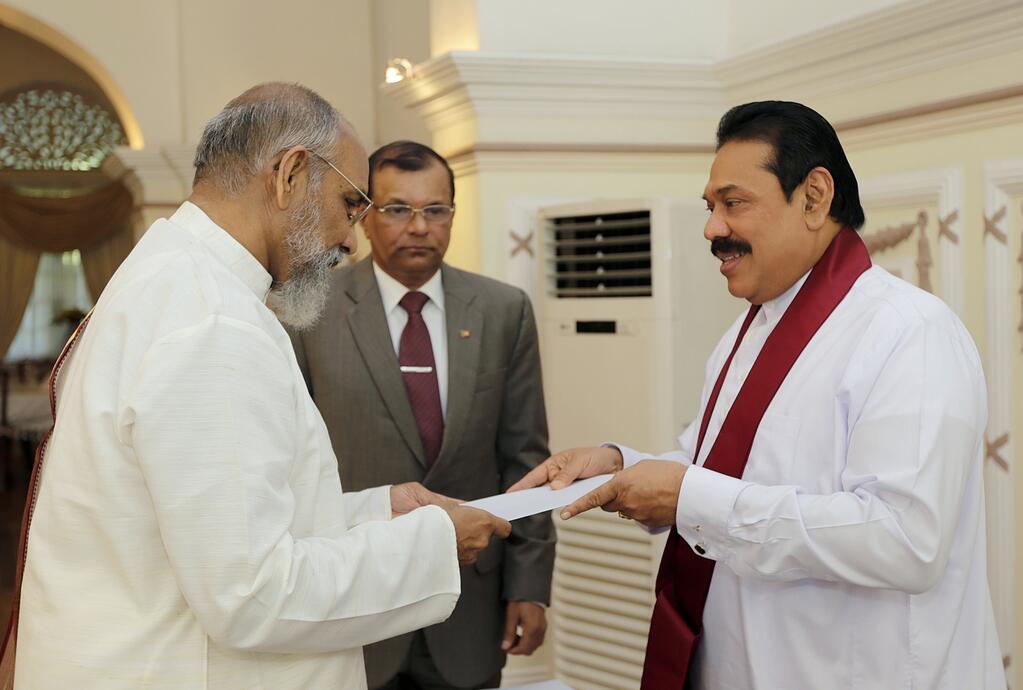Photo courtesy @PresRajapaksa
On Monday 7th October, the Tamil National Alliance, the only political party in the country to have comprehensively defeated the UPFA and captured power in the Northern Province, creating the first ever opposition controlled provincial council since the Peoples’ Alliance victory in the Southern Provincial Council in 1993, which also heralded the end of UNP rule an year later, politically reached out and magnanimously decided that it’s Chief Minister designate, retired Supreme Court Justice CV Wigneswaren should take his oath of office before President Mahinda Rajapakse at Temple Trees. In the ethnically polarized Sri Lankan society and polity, it was a very significant political gesture, magnanimity in victory and a unilateral concession to President Rajapakse by the TNA leadership, which the Rajapakse regime should be pressed to reciprocate.
Reaching out to President Rajapakse
The Rajapakse Administration in the post war period had not adequately addressed either the effects or the causes of the war. The only thing it has done has been reconstruction that focused solely on infrastructure with no focus on the victims of the conflict. Also the economic benefits of that infrastructure from fishing rights to tourism projects have been expropriated by the military or government cronies. Quite similar to the “carpet bagger” reconstruction, in the American South, following the Confederacy’s defeat in that country’s civil war. As far as a hearts and minds campaign goes, the election results indicate that a mere 17.5% of the Northern Province voted for the Government.
Further, the Rajapakse Administration tried rather ham handedly to weaken provincial powers further through the proposed 19th amendment, has been disinterested in implementing the LLRC recommendations and broke off the Indian initiated structured dialogue with the TNA. It is in this context, that the decision of the TNA to swear in before President Rajapakse should be viewed. It took the principled stand that it would not swear before the Governor, retired General Chandrasiri, who broke all norms for an appointed state official to campaign like a street activist on the UPFA public platforms in the North. The decent thing to have done following the results was to have resigned, nonetheless he is now on a tight leash with the TNA’s two third majority in the Council sufficient to pass a binding impeachment resolution on the Governor, if he seeks to frustrate and obstruct the democratic mandate of the Council. Following the impeachment of Chief Justice Bandaranaike, the bar for impeachment has been set quite low in Sri Lankan democracy.
Sambanthan shows true leadership and weakens the Diaspora
According to the 4th schedule to the Constitution, elected officials need only swear before a Justice of the Peace and the general TNA consensus was that its victorious Northern Provincial Council should swear in before their now undisputed political leader, Rajavarothiam Sambanthan. The election victory of the TNA, demonstrates the true difference between the Diaspora organizations, self appointed hardliners with a ludicrous nostalgia for the LTTE and the comparatively more moderate TNA, which with grass roots appeal and an engagement with the Sri Lankan State, secured the democratic mandate of the Tamil people of Sri Lanka. The center of gravity of the Tamil political leadership has indisputably consolidated comprehensively in the hands of the TNA leadership in Trincomalee and Colombo, namely Sambanthan and Sumanthiran and the popular pro government theory that the TNA is controlled by the Diaspora is disproved by the facts.
The pro government and Sinhala nationalist sections of the press, has been taking great delight in a narrative which went something like this. The TNA is weak and divided; it is only one among many Tamil political leadership voices, the Diaspora controls the TNA and eventually it will lose its political clout to government allies in the ruling alliance, such as the EPDP and the TMVP and become at best another CWC or an SLMC. Nothing like a dose of electoral reality to break a propaganda myth. The TNA captures nearly 80% of the popular vote in the entire Northern Province, secures a two third majority in that Council; it defeats the EPDP in even their pocket borough of the Kytes constituency and uses its two bonus seats to appoint a Muslim and women showing sensitivity to Muslim and gender issues. The so called divisions in the TNA are nothing more than normal electoral and alliance politics pales in comparison to the UPFA’s difficult choice for Chief Minister of the Central Province, ignoring a Prime Ministerial offspring who secured the highest preference vote, the Cabinet rebellion over the proposed 19th amendment, the ongoing political struggle in Anuradhapura between the supporters of the late Bertie Premlal and SM Ranjith, the complete contradictory positions on devolution between key UPFA constituents such as the JHU, NFF on the one hand and the CP, LSSP, NSSP and the Liberal Party on the other side.
In recent times, the TNA leader, Sambanthan has been exercising great political leadership, in pushing through far reaching and moderating political changes in Tamil politics, which has weakened the Diaspora and strengthened his moderate leadership. First he personally bucked the entire Tamil polity and single handedly persuaded and then steered the most eminent retired Tamil jurist in Sri Lanka to election as the first ever Chief Minister of the North. In victory, he made a major concession and political rapprochement with President Rajapakse by coming before the President to be sworn into office, to provide the most public and visible commitment to both an engagement with the Rajapakse regime and a united and undivided Sri Lanka.
The best bulwark and defense against an extremist Diaspora Tamil polity, is a strong and moderate Sri Lankan Tamil political leadership. In Sambanthan, Sumanthiran and Vigneswaren, Sri Lanka is beginning to get that. The Rajapakse regime must seize the opportunity and move forward towards rapprochement and reconciliation.
